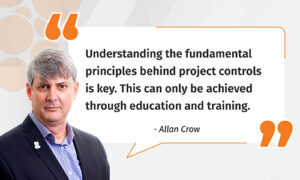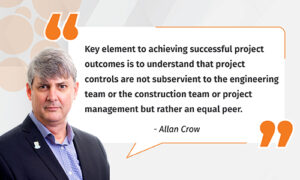
Organizations can benefit from numerous opportunities when they maintain project controls correctly. However, the process may also lead to troublesome results in the case of lacking certain approaches.
Cost Engineering’s Business Developer, Shamir Sheikkariem sat down with Allan Crow (Director of Allied Projects & AACE Chair WA/NT) to dive deep into the challenges and opportunities of project controls by taking Mr. Crow’s extensive experiences in the field as basis. They also uncovered the country-specific factors and their significance, especially for Australia.
A Career that Starts in South Africa in Electrical Trades to Australia in Project Controls
Shamir S.: Hello Allan, it is great to have you here. Thank you for taking the time to answer my questions. There are many things we will cover today, but I would like to start by getting to know your professional journey. How did you start your career?
Allan C.: I started my career in the electrical trades (heavy current) in South Africa and quickly moved to power system protection engineering. In 1998, I moved to the UK and worked for a small power engineering consultancy before moving to ABB, my dream company, as Commissioning Team Lead. When I took the leadership role for a new department as Protection Systems Manager, my team and I delivered protection systems for some iconic projects in the UK.
I moved to Perth, Australia in 2006 as the first Principal Protection Engineer for AECOM. Shortly after, I realized that Australia, especially Perth, was almost 20 years behind the rest of the world in regard to power system protection understanding and so decided I had to change career or return to the UK.
I stayed and accepted the role of Commercial Manager at AECOM. During this role, there was much furore around understanding the delivery of project controls for a significant mining project and I was asked to provide assistance. It did not take me long to get my head around it and it soon became evident there was a lack of understanding of the core concepts of project controls.
A year later, I was asked to take on the position of Manager Project Controls, leading a team of estimators, planners/schedulers, cost controllers, document controllers and a couple of other project controls managers.
Next to these, my current roles include Chairman for Association of Cost Engineering (AACEi) Australian Section for WA & NT and Director of Allied Projects – Project Management Consultants, based in Australia.

Shamir S.: Sounds like you were involved in different roles on an international level. Could you give an overview of your experience as a project cost controller, in specific?
Allan C.: Although I fully understand what is involved in performing the role of a project cost controller, I have never actually held the position of one. The same goes for estimating and planning/scheduling.
My roles have primarily been around providing technical understanding with real hands-on involvement in project delivery with a focus on the estimate, cost and schedule. In other words, cost engineering to manage the scope.
My experience in cost engineering and project controls is broad. Yet, I have the ability to go right into the technical details of why things require to be done in a specific way. I suppose I take my cue from my earlier power system protection engineering career where technical understanding is of utmost importance.
A Vision on Integrated Project Controls
Shamir S.: It must be great to be able to think from different perspectives when needed to, based your experiences. Considering this, what is your vision on integrated project cost control?
Allan C.: My vision of integrated project controls starts with everyone having an understanding of their surroundings. Too many times, I have witnessed silos between the estimator, planner/scheduler, cost controller and even the project team in general.
Unfortunately, many estimators see themselves as owning the universe and they do estimates that only serve their needs. On the other hand, Planners/Schedulers see themselves as the centre of the universe. So, they undertake planning and scheduling without any regard to how the estimate was compiled or how costs are going to accrue or earned value will be calculated and reported. The cost controller flips back and forth between the parties, not quite sure how to respond but ultimately tries to please everyone.
Therefore, it is my vision to have a fully integrated project cost management system that covers the entire scope (Estimate = Schedule = Scope). Having that said, achieving integrated project controls does not necessarily mean having complex software systems but rather having a detailed understanding of coding structures in the estimate, schedule and cost that allows data to be inputted once and for the data to flow seamlessly between them.

Australian Perspective into Project Controls
Shamir S.: From a country-specific perspective, how could this be translated to projects in Australia?
Allan C.: Understanding the fundamental principles behind project controls is key. This can only be achieved through education and training. AACE offers several internationally accredited qualifications that companies in Australia should include as mandatory during the recruitment process. Training across the board in project controls should be made available to the entire project team, including the engineering, procurement & contracts, construction and most importantly senior management.
When everyone understands the fundamentals of project controls this will undoubtedly lead to higher quality project delivery for the entire team.
Shamir S.: So all starts from building the bricks on durable fundamentals. And how about the handover from the front-end development to project management?
Allan C.: Project controls is about Scope Management. To successfully deliver the project, project controls require having full appreciation and understanding of the scope across the entire project. It is therefore important to match your project controls personnel skills and experience to the scope of the project.
For example, if the company is delivering a project having significant civil components, then it makes perfect sense to have civil disciplined engineering personnel within the project controls team. Matching skilled personnel to the project means the handover of a fully scoped project to project management will likely result in a higher quality and more accurate outcome.
It’s Not All Sunshine And Roses: Challenges to Deal with in the Project Controls Field
Shamir S.: And things may not go as expected or planned most of the time due to the complexity and the number of people in such projects. What have you encountered as being the main challenges in the field of project controls?
Allan C.: Breaking down silos within the project controls disciplines is a significant challenge. Another huge challenge is bringing management up to speed on the purpose of project controls. I believe one solution is education and training. However, I also believe that having an experienced project controls practitioner, or project board, at the company will undoubtedly change how project controls is seen by the project delivery team.
Shamir S.: Are there any challenges specific to Australia? Perhaps related to the culture, geography, or the maturity of project controls in Australia?
Allan C.: Compared to the rest of the western world, Australian’s management and leadership style is very different. There are no clear lines of management authority and there is limited technical authority. Everyone is considered “a mate”.
Generally speaking, this means everyone wants to do it their own way. Rather than using well-defined and established approaches that have been tried and tested successfully across the world, everyone wants to reinvent the wheel.

Shamir S.: It is understandable how these challenges can significantly impact the overall process. But what are the best ways of overcoming them?
Allan C.: The best way to overcome these challenges is for senior management to fully support and endorse the Project Services Manager (PSM) or Project Controls Manager (PCM). The PSM & PCM should have the same standing as the Project Manager, Engineering Manager and Construction Manager. They are there not in a subservient position but as an equal team member delivering the project. However, for this to occur the PSM / PCM requires having technical authority across project controls.
As the World Moves Forward: Digitalization of Project Controls
Shamir S.: In your opinion, what is necessary to increase the digitalization of project controls?
Allan C.: Unfortunately, digitalization of project controls requires going back to the basics, the fundamentals. This implies taking one step backwards before we can begin to take steps forward. We need to ask ourselves: What value will digitization of project controls bring if we are in a constant fight with engineering managers, construction managers, project managers in regards to how we measure earned value, how we measure progress or even how we group and categorise WBS and control accounts?
Once all have a firm understanding of the correct way of doing these things, then digitization of project controls will leap forward.
Shamir S.: What are the key elements for making this work?
Allan C.: Key element is education and training of the entire project delivery team.

Lessons Learned
Shamir S.: Before we end the interview, I would like to dive deep into the lessons you learned in all these years and highlight some elements to make sound decisions for future projects. What is the key risk associated with project controls in your opinion?
Allan C.: A key risk associated with project controls is the dilution of the importance it brings to the delivery of projects. To successfully deliver projects, there require having personnel with the right skill sets fitting for the roles.
Just because schedulers can drive Primavera P6 software, it does not make them project controls managers. Or just because an engineer can operate an Excel spreadsheet and add up expended hours, it does not imply they understand how to do forecasting. The risk to projects is insurmountable because we now have personnel who are inadequately equipped trying to juggle roles outside of their core competency.
Shamir S.: How about the main lessons learned?
Allan C.: Communication and inclusion is a key lesson learned. If project controls personnel are not included in the daily conversations (engineering, construction or otherwise) then how can they be expected to provide the required project outputs?
Shamir S.: And last but not least, what are the prominent elements to successfully achieve a successful outcome of your project?
Allan C.: A key element to achieving successful project outcomes is to understand that project controls are not subservient to the engineering team or the construction team or project management but rather an equal peer.
Project controls require being integrated into the project delivery from the start as it will be them who will dictate how the packages will be formulated, how the control accounts will be managed and how progress will be measured, tracked and recorded.
Unfortunately, I have experienced too many instances where project controls are forced by engineering or construction to track, manage and report on things that don’t quite add up. It is a case of fitting a square peg into a round hole.
Allan Crow, Director | Allied Projects | AACE Chair WA/NT (Australia)
Allan has extensive international business experience. He has served in roles such as project services manager, project controls manager, senior project manager, and commercial manager. Previously, he also worked as a power systems protection engineering manager. He has worked on both sides of the fence as Project Controls Manager for EPC, EPCM and Owners Teams.
Adding to his current roles as the Director at Allied Projects and the Chair for AACEi WA/NT, his previous companies include:
- AECOM (Commercial Manager, Manager Project Controls)
- WorleyParsons (General Manager WA Operations LMA Projects)
- SKM/Jacobs (Project Controls Manager RioTinto Iron Ore Expansion Projects)
- Ausenco, Forrestfield Airport Link, Roy Hill – Forge Group, Iluka, South32 and ABB
He has a deep understanding of Project Controls and Project Management from his vast experience, which has been backed by his completing an MBA at Heriot-Watt University (Edinburgh Business School – Scotland).
Shamir Sheikkariem, Business Developer | Mining Expert
Shamir holds a Bachelor’s degree in Mineral Resource Management and a Master’s degree in Mineral Geosciences. He has 10 years of operational, active exploration and technology consultancy experience in mining and energy industries in the Netherlands and Suriname.
The lessons learned, and the experience gained continue to define Shamir into the experienced professional he is today. With a strong focus on digitalization, Shamir is now working with the mining companies. He is determined to contribute to a sustainable future through digital project controls in the mining industry.
Companies Shamir previously worked at are:
- Nana Resources – Developing Gold Mining Project in Suriname, Managing Artisanal Mining Contractors, Oversaw and Executing Several Local Exploration Projects
- Venture IQ – Performing pro-active lead generation and deal flow management. Providing investment and partnering advice for corporate venture capital for corporate clients in the mining and energy sector
- Nana Projects – Buese Project, Upper Antino Project, Lower Antino Project, NEMS Project
Project costs are derived from the required resources needed to complete the objective, which might be anything from…
Before starting a Cost Estimation for a technical project, it is important to have the knowledge of both…
Related resources
A selection of user stories from our customers, explaining the value that Cleopatra Enterprise adds to their projects.
Mining Industry: Reduce cost overrun risks
“The mining industry is one of the only industries where the problem of underperformance is a structural problem…
Read blog articleThe Energy Transition: How the growing demand for metals is fueling Mining Projects
The energy transition is happening right now: the world is moving to a cleaner infrastructure. To make this…
Read blog article


